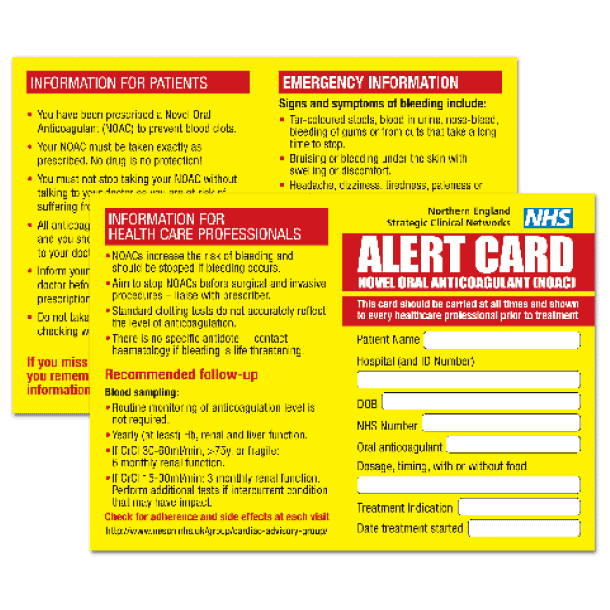Summary
Unlike the warfarin monitoring ‘yellow book’, there is no standard patient alert tool for novel oral anticoagulants (NOACs). So this standardised card was developed for use across primary and secondary care within the north of England’s strategic clinical network. Doctors, pharmacists and specialists participated in its developed process, as did local patient groups. The card was designed to be easily recognisable, with a similar colour to the bright yellow warfarin monitoring books, and able to be fitted in a purse or wallet. Launched in April 2015 across the network with supporting educational material, the card aims to increase patient knowledge about their treatment and inform and educate health professionals to improve patient safety.
Challenge
Up to 2.4% of UK patients per year are prescribed anticoagulant medication to prevent strokes in atrial fibrillation and to treat venous thromboembolism – and these numbers will rise as the population ages. The management of warfarin is well understood but there are many reports of ‘near miss’ patient safety events involving NOACs and the existence of multiple, slightly different, physician and patient education tools can lead to more confusion than clarity.
Objectives
By developing a patient safety alert card for NOACs which includes patient and clinician education material, the team aimed to take advantage of the infrastructure of the strategic clinical network to allow an integrated and standardised approach across different NHS trusts, regional boundaries and primary and secondary care. The card will make a comprehensive and standardised set of information available to patients prescribed NOACs regarding their therapy, and to the staff who treat them.
Solution
The team formed a project group to design the card with input from clinicians, pharmacists, haematologists and other stakeholders. Local patient groups were consulted to gain valuable input regarding content, presentation and size of card. Implementation strategy was planned after liaising with the three local pharmacy networks and primary care colleagues, carried out alongside a parallel project distributing a NOAC guide for GPs, a two-side summary of practical aspects of NOAC use developed locally. An electronic bulletin advised of the card launch to all GPs, pharmacies, secondary care physicians and doctors in training in the region. At launch on 22 April 2015, a supply of cards was delivered to all primary and secondary care pharmacies in the region with a hard copy of an educational and explanatory letter - GPs were offered the option of a supply of the cards to distribute themselves if they wished. A strategy of primarily targeting pharmacists to distribute the cards was felt to be potentially more effective as they are the individuals who actually issue the drugs.
Results
Since the card was recently launched there is only informal feedback at this stage. There are difficulties in obtaining direct data regarding how many cards each individual pharmacy has issued and correlating that with total numbers of local new NOAC prescriptions issued. Gathering data of this type is beyond the timescale and budget of this project and hampered by the limitations of NHS record keeping infrastructure. But the card will improve patients’ knowledge about their drugs and empower them to take control of their treatments, leading (it is hoped) to improved adherence and safe use of these drugs – and can be extended to other parts of the country with a final objective of a standardised national patient alert card.
Learnings
The development and implementation of the card was more challenging than anticipated. The concept had universal support from anyone approached and there has been a huge demand and appetite for the card from colleagues across the region and country. Despite all this positive support, actually getting agreement regarding content and facilitating the implementation has been challenging – and despite the relatively small sums of money required to print and distribute the card, it has been a struggle. However, the experiences from sharing the card and with a national webinar event have highlighted the ongoing enthusiasm for collaboration across the country and the advantages that web events may have in facilitating this.
Evaluation
With the support of Bayer, the team plans to phone all secondary care trusts and all community pharmacists to ask if they received a supply of the cards and to reinforce the educational messages. A proportion of these have been contacted to date and show high levels of pharmacy awareness and very positive feedback comments. Pharmacists will be approached for their opinions and feedback on two occasions, near the start and end of the project. Meanwhile a sample of patients who have had a new prescription of a NOAC issued since the card implementation will be contacted via their practice. A questionnaire will be sent out with a postage-paid return, asking whether the patient received a card, who from, if they find it acceptable and how many times they may have used it.



